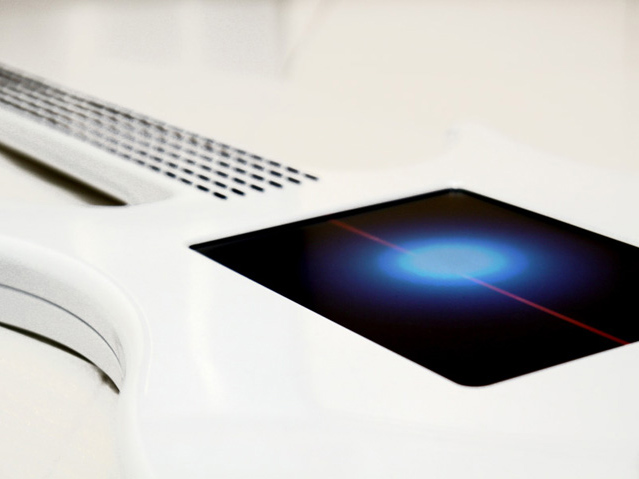Misa Digital Guitar replaces strings with touchscreen

The Misa Digital Guitar is quite unlike any other 'electronic axe' we've seen, being designed not to replace your traditional guitar, but to complement it as a completely different instrument.
Although its form is similar to that of a standard guitar, the Misa device is played in a unique way. Your left hand is still used to select notes (there are 24 frets), but the right hand does rather more than pluck strings. In fact, there aren't any strings to pluck.
"In electronic music, the timbre (or colour) of the sound can be morphed in an infinite number of ways," explains Misa Digital. "For a guitar to accommodate this, the right hand needs more control than just plucking strings. You need to be able to control elements of the sound, such as sustain, pitch, filter cutoff, contour or any other synthesizer parameter, in a way that has no physical constraints."
"This was [the] thought process when designing the Misa Digital Guitar. There are no strings on this instrument. The right hand doesn't pluck strings, it controls sound."
When playing the Misa Digital Guitar, your right hand is used to operate a touchscreen. No sound is generated internally - this is effectively a MIDI controller and as such is used to send messages to your computer or sound module. The software is Linux-based and open source.
If you're interested in purchasing a Misa Digital Guitar, there's a contact email on the company website. However, no price is currently listed.
Here's a video demo so you can see how it works.
Want all the hottest music and gear news, reviews, deals, features and more, direct to your inbox? Sign up here.
(Via Engadget)

I’m the Deputy Editor of MusicRadar, having worked on the site since its launch in 2007. I previously spent eight years working on our sister magazine, Computer Music. I’ve been playing the piano, gigging in bands and failing to finish tracks at home for more than 30 years, 24 of which I’ve also spent writing about music and the ever-changing technology used to make it.